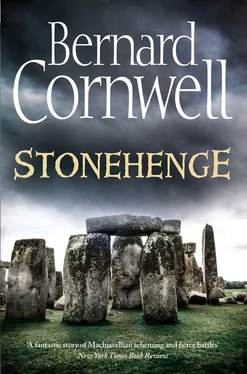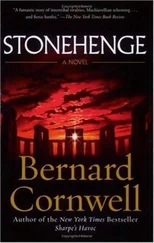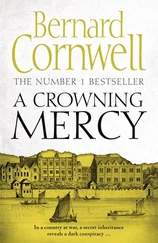The stranger saw bracken and, beyond it, where the soil was thin above the underlying chalk, grassland. There were grave mounds dotted on the grassland’s low crest. Pigs rooted in the bracken while white cattle grazed the pastureland. The sun still shone here. The stranger stayed a long while at the wood’s edge, looking for enemies, but seeing none. Off to his north, a long way off, there were wheatfields fenced with thorn over which the first clouds, outriders of the storm, were chasing their shadows, but all ahead of him was sunlit. There was life ahead, darkness behind, and the small horse, unbidden, suddenly jolted into the bracken. The rider let it carry him.
The horse climbed the gentle slope to the grave mounds. Lengar and Saban waited until the stranger had disappeared over the skyline, then followed and, once at the crest, they crouched in a grave’s ditch and saw that the rider had stopped beside the Old Temple.
A grumble of thunder sounded and another gust of wind flattened the grass where the cattle grazed. The stranger slid from his horse’s back, crossed the overgrown ditch of the Old Temple and disappeared into the hazel shrub that grew so thick within the sacred circle. Saban guessed the man was seeking sanctuary.
But Lengar was behind the Outlander, and Lengar was not given to mercy.
The abandoned horse, frightened by the thunder and by the big cattle, trotted west towards the forest. Lengar waited until the horse had gone back into the trees, then rose from the ditch and ran towards the hazels where the stranger had gone.
Saban followed, going to where he had never been in all his twelve years.
To the Old Temple.
Once, many years before, so long before that no one alive could remember those times, the Old Temple had been the greatest shrine of the heartland. In those days, when men had come from far off to dance the temple’s rings, the high bank of chalk that encircled the shrine had been so white that it seemed to shine in the moonlight. From one side of the shining ring to the other was a hundred paces, and in the old days that sacred space had been beaten bare by the feet of the dancers as they girdled the death house that had been made from three rings of trimmed oak trunks. The smooth bare trunks had been oiled with animal fat and hung with boughs of holly and ivy.
Now the bank was thick with grass and choked by weeds. Small hazels grew in the ditch and more hazels had invaded the wide space inside the circular bank so that, from a distance, the temple looked like a grove of small shrubs. Birds nested where men had once danced. One oak pole of the death house still showed above the tangled hazels, but the pole was leaning now and its once smooth wood was pitted, black and thick with fungi.
The temple had been abandoned, yet the gods do not forget their shrines. Sometimes, on still days when a mist lay on the pasture, or when the swollen moon hung motionless above the chalk ring, the hazel leaves shivered as though a wind passed through them. The dancers were gone, but the power remained.
And now the Outlander had gone to the temple.
The gods were screaming.
Cloud shadow swallowed the pasture as Lengar and Saban ran towards the Old Temple. Saban was cold and he was scared. Lengar was also frightened, but the Outfolk were famous for their wealth, and Lengar’s greed overcame his fear of entering the temple.
The stranger had clambered through the ditch and up the bank, but Lengar went to the old southern entrance where a narrow causeway led into the overgrown interior. Once across the causeway Lengar dropped onto all fours and crawled through the hazels. Saban followed reluctantly, not wanting to be left alone in the pasture when the storm god’s anger broke.
To Lengar’s surprise the Old Temple was not entirely overgrown for there was a cleared space where the death house had stood. Someone in the tribe must still visit the Old Temple, for the weeds had been cleared, the grass cut with a knife and a single ox-skull lay in the death house where the stranger now sat with his back against the one remaining temple post. The man’s face was pale and his eyes were closed, but his chest rose and fell with his laboured breathing. He wore a strip of dark stone inside his left wrist, fastened there by leather laces. There was blood on his woollen trews. The man had dropped his short bow and his quiver of arrows beside the ox-skull, and now clutched a leather bag to his wounded belly. He had been ambushed in the forest three days before. He had not seen his attackers, just felt the sudden hot pain of the thrown spear, then kicked his horse and let it carry him out of danger.
‘I’ll fetch father,’ Saban whispered.
‘You won’t,’ Lengar hissed, and the wounded man must have heard them for he opened his eyes and grimaced as he leaned forward to pick up his bow. But the stranger was slowed by pain, and Lengar was much faster. He dropped his longbow, scrambled from his hiding place and ran across the death house, scooping up the stranger’s bow with one hand and his quiver with the other. In his hurry he spilled the arrows so that there was only one left in the leather quiver.
A murmur of thunder sounded from the west. Saban shivered, fearing that the sound would swell to fill the air with the god’s rage, but the thunder faded, leaving the sky deathly still.
‘Sannas,’ the stranger said, then added some words in a tongue that neither Lengar nor Saban spoke.
‘Sannas?’ Lengar asked.
‘Sannas,’ the man repeated eagerly. Sannas was the great sorceress of Cathallo, famous throughout the land, and Saban presumed the stranger wanted to be healed by her.
Lengar smiled. ‘Sannas is not of our people,’ he said. ‘Sannas lives north of here.’
The stranger did not understand what Lengar said. ‘Erek,’ he said, and Saban, still watching from the undergrowth, wondered if that was the stranger’s name, or perhaps the name of his god. ‘Erek,’ the wounded man said more firmly, but the word meant nothing to Lengar who had taken the one arrow from the stranger’s quiver and fitted it onto the short bow. The bow was made of strips of wood and antler, glued together and bound with sinew, and Lengar’s people had never used such a weapon. They favoured the longer bow carved from the yew tree, but Lengar was curious about the odd weapon. He stretched the string, testing its strength.
‘Erek!’ the stranger cried loudly.
‘You’re Outfolk,’ Lengar said. ‘You have no business here.’ He stretched the bow again, surprised by the tension in the short weapon.
‘Bring me a healer. Bring me Sannas,’ the stranger said in his own tongue.
‘If Sannas were here,’ Lengar said, recognizing only that name, ‘I would kill her first.’ He spat. ‘That is what I think of Sannas. She is a shrivelled old bitch-cow, a husk of evil, toad-dung made flesh.’ He spat again.
The stranger leaned forward and laboriously scooped up the arrows that had spilled from his quiver and formed them into a small sheaf that he held like a knife as though to defend himself. ‘Bring me a healer,’ he pleaded in his own language. Thunder growled to the west, and the hazel leaves shuddered as a breath of cold wind gusted ahead of the approaching storm. The stranger looked again into Lengar’s eyes and saw no pity there. There was only the delight that Lengar took from death. ‘No,’ he said, ‘no, please, no.’
Lengar loosed the arrow. He was only five paces from the stranger and the small arrow struck its target with a sickening force, lurching the man onto his side. The arrow sank deep, leaving only a hand’s-breadth of its black-and-white feathered shaft showing at the left side of the stranger’s chest. Saban thought the Outlander must be dead because he did not move for a long time, but then the carefully made sheaf of arrows spilled from his hand as, slowly, very slowly, he pushed himself back upright. ‘Please,’ he said quietly.
Читать дальше












